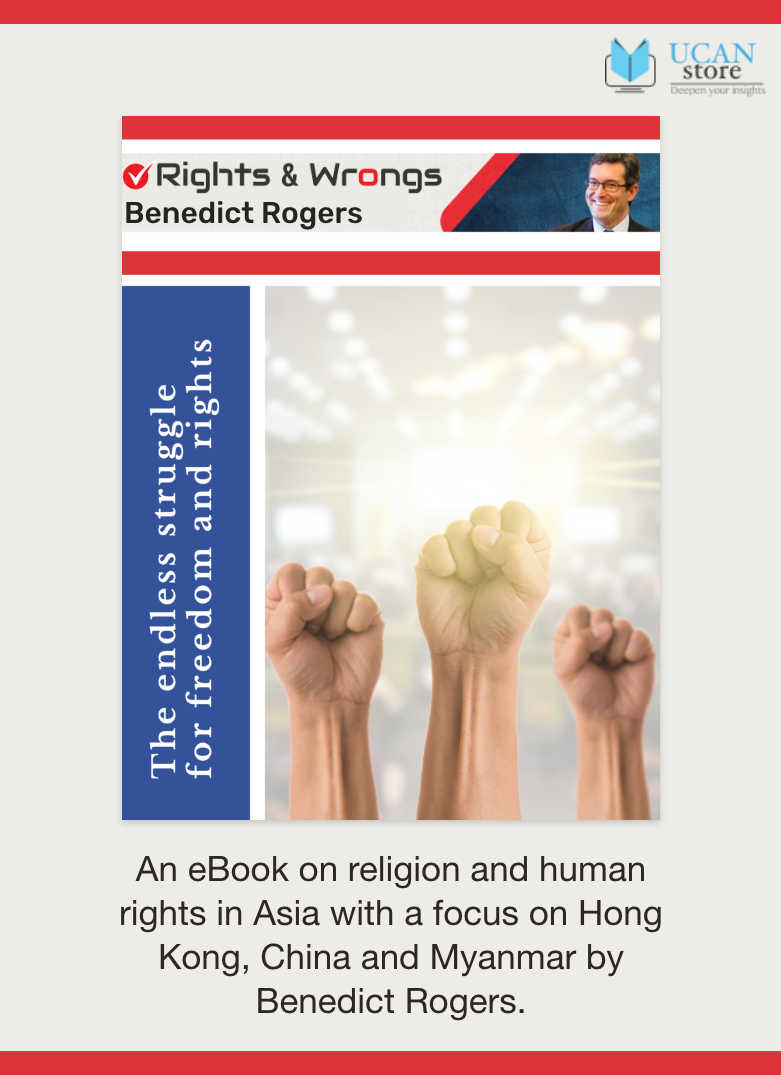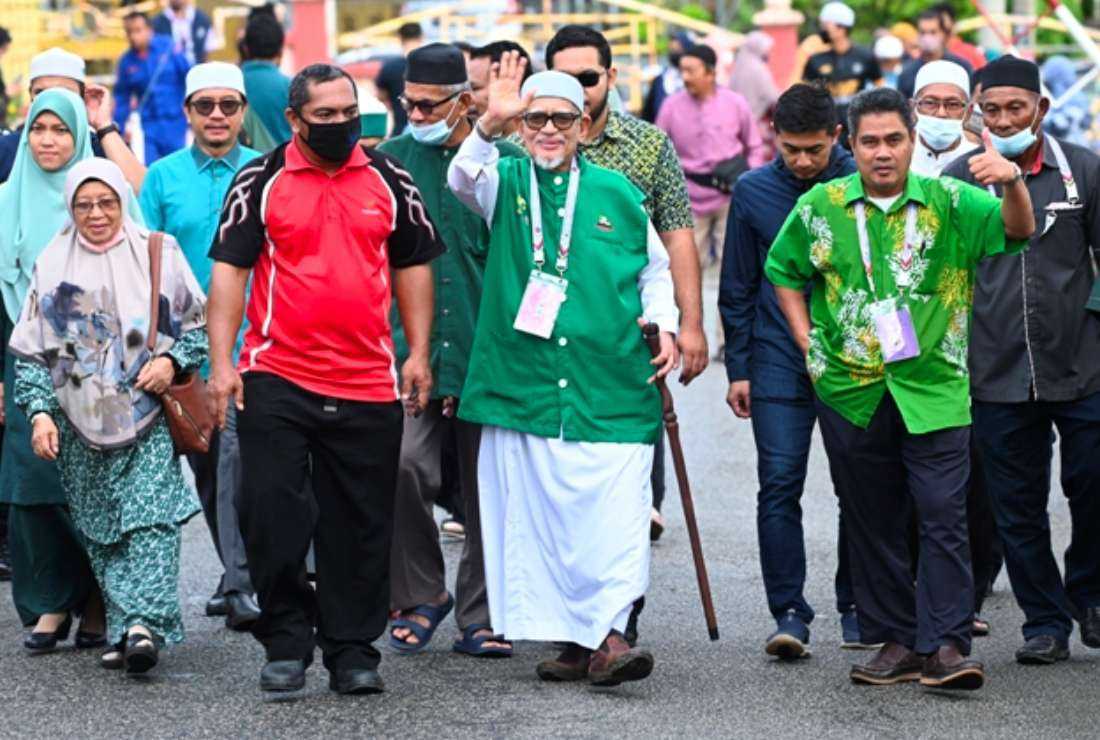
It proved effective in the general election last November when PAS won the most seats in the Lower House

This handout photo shows Abdul Hadi Awang (center), the president of The Malaysian Islamic Party (PAS) waving during the general election in Marang, Malaysia's Terengganu state on Nov. 19, 2022. (Photo: AFP)
Malaysia is looking at six state elections in the next few months and the hunting season is in full swing for the Islamist party and those aligned to it. They target non-Muslims and often focus on their traditional nemesis, the Christians. They say that these people are out to destroy the “Malay race, their religion and the country.” It is a strategy they have used for decades.
The political strategies deployed by the Parti Islam Se-Malaysia (PAS) over the last couple of decades ranged from claims that Christians practice the caste system; Christians are preying on the marginalized; to Christians disguising themselves as imams (religious teachers) and preaching in mosques. The latest was in March when they accused a cabinet minister, who is a Protestant, of abusing her position and organizing visits to houses of worship to convert Muslims.
The non-Muslims’ response is of no concern to them. Their target audience is the Malay Muslims and the goal is to increase their power base so they can establish their brand of theocracy in Malaysia, or at the least replace secular laws with Sharia ones. They need to convince this segment of voters of their commitment and sincerity in upholding Islam tenets, and in fighting the enemies of Islam and the state, namely secularists, communists, ethnic Chinese and Christians.
The bogeyman strategy is effective. In the general election last November, PAS won the most seats in the Lower House, which is the stronger of the two houses in Malaysia’s bicameral parliament. In fact, the party won almost three times more seats than in the previous election, making the 2022 general election its best. They are no longer only pulling votes from rural Malays but also from the middle-class and civil servants, who are predominantly Malays and traditional supporters of Umno (United Malays National Organization).
Just days before that general election, one of PAS’ allies in the Perikatan Nasional (PN - National Alliance) used the race-religion card. The alliance’s prime ministerial candidate Muhyiddin Yassin claimed that Jewish and Christian groups were planning to take over Malaysia with the help of their rival Pakatan Harapan (Alliance of Hope), the bloc with a multiracial mix and is backed by urbanites. Muhyiddin is a former prime minister (2020-2021) and also deputy prime minister in the Najib Razak administration.
The race-religion card is an old one, used blatantly by several Muslim leaders including those from Umno. One of them was former prime minister, Mahathir Mohamad. Two weeks ago, the 97-year-old revisited this old strategy. He teamed up with his one-time political rival, PAS president, Abdul Hadi Awang, and the two signed the Malay Proclamation with the purpose of uniting the Malays and “saving the Muslim community.”
"Children are indoctrinated from a young age that it is their duty to support PAS otherwise they would go to hell"
Mahathir’s not the only one wooing PAS. A few days ago, Anwar Ibrahim met the sons of a deceased PAS leader and there is news that the prime minister wants to work with Hadi again. Anwar’s Parti Keadilan Rakyat (People’s Justice Party) got the third-highest number of seats in last November’s general election and was asked by the king to form the government. Anwar was able to do so without PAS but there is now talk of his government being shaky.
The upcoming state elections are likely to keep the status quo. Anwar’s bloc will continue to govern the more urban Selangor, Penang and Negeri Sembilan states and the PAS alliance Kelantan, Terengganu and Kedah states. PAS will likely emerge with more seats, giving them total control over rural Malaysia.
PAS’ strength comes from decades of patiently building strong grassroots in the northern and eastern peninsular states through religious education. They started setting up school huts and madrasahs, and today have professionally run kindergartens and schools. It is here that children are indoctrinated from a young age that it is their duty to support PAS otherwise they would go to hell. This is why the party enjoys an enviable level of loyalty. PAS can muster a street protest at the drop of a hat. No other party can.
For a short time, PAS swallowed its pride and worked with the Democratic Action Party and other parties to topple Najib and later be part of the new government under Mahathir in 2018. But that was then. PAS may never again need to team up with the predominantly ethnic Chinese party which also has Christians as members.
A survey of Malaysian Muslim youth showed that 82 percent of the 1,216 respondents said there should be a revival of an Islamic caliphate. The 2022 survey also showed 82 percent felt the Quran should replace the Constitution. It was 72 percent in a survey done in 2010.
The recent verdict of a sedition suit against Hadi could not have come at a better time. Two Christians failed last month in their final bid to revive their suit against Hadi over alleged seditious remarks he made against Christians.
PAS is likely to project this as divine intervention and Islam’s victory over Christians in their campaigning for the upcoming state elections.
*The views expressed in this article are those of the author and do not necessarily reflect the official editorial position of UCA News.
Help us keep UCA News independent
The Church in Asia needs objective and independent journalism to speak the truth about the Church and the state.
With a network of professionally qualified journalists and editors across Asia, UCA News is just about meeting that need. But professionalism does not come cheap. We depend on you, our readers, to help maintain our independence and seek that truth.
A small donation of US$2 a month would make a big difference in our quest to achieve our goal.

Share your comments